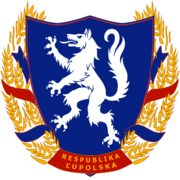Marš Pobiede: Difference between revisions
No edit summary |
No edit summary |
||
| Line 44: | Line 44: | ||
| | | | ||
<!-- s1p1--> | <!-- s1p1--> | ||
{{IPAc-lupl|[- | {{IPAc-lupl|[-|h|a|j|d|e|-|z|d|r|u|'|zh|i|m|a|}} | ||
{{IPAc-lupl|-- | {{IPAc-lupl|--|h|v|a|l|u|-|d|a|'|j|a|t|i}}[[Help:IPA/Luepolan|<nowiki>]</nowiki>]]<br> | ||
{{IPAc-lupl|[-|s|t|r|a|'|n|u|-|s|o | {{IPAc-lupl|[-|s|t|r|a|'|n|u|-|s|o|v|r|aa|n|u}} | ||
{{IPAc-lupl|--|'|s|l|o|b|o|d|n|e|g|-|'|lj|u|d|ii}}[[Help:IPA/Luepolan|<nowiki>]</nowiki>]]<br> | {{IPAc-lupl|--|'|s|l|o|b|o|d|n|e|g|-|'|lj|u|d|ii}}[[Help:IPA/Luepolan|<nowiki>]</nowiki>]]<br> | ||
{{IPAc-lupl|[- | {{IPAc-lupl|[-|k|d|e|-|m|i|-|d|r|'|zh|i|m|a}} | ||
{{IPAc-lupl|--|v|o | {{IPAc-lupl|--|v|o|lj|u|-|n|a|j|'|v|a|zh|n|i}}[[Help:IPA/Luepolan|<nowiki>]</nowiki>]]<br> | ||
{{IPAc-lupl|[-|u|'|k|uu|d|a|-|s|v|e|}} | {{IPAc-lupl|[-|u|'|k|uu|d|a|-|s|v|e|}} | ||
{{IPAc-lupl|--|t|i | {{IPAc-lupl|--|t|i|r|a|nj|e|-|k|i|'|dj|a|l|i}}[[Help:IPA/Luepolan|<nowiki>]</nowiki>]]<br> | ||
<!-- s1p2--> | <!-- s1p2--> | ||
{{IPAc-lupl|[-|'|j|a|k|o|-|m|i|-|s|e|-|t|o|m|i|l|i}} | {{IPAc-lupl|[-|'|j|a|k|o|-|m|i|-|s|e|-|t|o|m|i|l|i}} | ||
{{IPAc-lupl|--|v|-|o|k|o|v|a|h}}[[Help:IPA/Luepolan|<nowiki>]</nowiki>]]<br> | {{IPAc-lupl|--|v|-|o|'|k|o|v|a|h}}[[Help:IPA/Luepolan|<nowiki>]</nowiki>]]<br> | ||
{{IPAc-lupl|[-|r|u|k|u|-|n|e|g|-|k|r|ee|t|a|l}} | {{IPAc-lupl|[-|'|r|u|k|u|-|n|e|g|-|k|r|ee|t|a|l}} | ||
{{IPAc-lupl|--|o|t|uh|c|-|n|a|j|s|v|ee|t|i}}[[Help:IPA/Luepolan|<nowiki>]</nowiki>]]<br> | {{IPAc-lupl|--|o|t|uh|c|-|n|a|j|'|s|v|ee|t|i}}[[Help:IPA/Luepolan|<nowiki>]</nowiki>]]<br> | ||
{{IPAc-lupl|[-|n|i|nj|e|-|s|e|-|l|e|zh|u}} | {{IPAc-lupl|[-|n|i|nj|e|-|s|e|-|'|l|e|zh|u}} | ||
{{IPAc-lupl|--|l|o|m|a|l|i|-|v|-|p|o|lj|a|h}}[[Help:IPA/Luepolan|<nowiki>]</nowiki>]]<br> | {{IPAc-lupl|--|l|o|m|a|l|i|-|v|-|'|p|o|lj|a|h}}[[Help:IPA/Luepolan|<nowiki>]</nowiki>]]<br> | ||
{{IPAc-lupl|[-|n|i|k|a|d|-|v|i|sh|e|-|n|a|sh}} | {{IPAc-lupl|[-|n|i|'|k|a|d|-|v|i|sh|e|-|n|a|sh}} | ||
{{IPAc-lupl|--|n|a|r|o|d|-|u|g|n|e|s|t|i}}[[Help:IPA/Luepolan|<nowiki>]</nowiki>]]<br> | {{IPAc-lupl|--|n|a|'|r|o|d|-|u|g|n|e|s|t|i}}[[Help:IPA/Luepolan|<nowiki>]</nowiki>]]<br> | ||
|style="font-weight:bold;"|<poem>Let us join together to give praise | |style="font-weight:bold;"|<poem>Let us join together to give praise | ||
| Line 85: | Line 85: | ||
''Prepare for the battle'' | ''Prepare for the battle'' | ||
''and let's get going!''</poem> | ''and let's get going!''</poem> | ||
|- | |||
|style="font-weight:bold;"|<poem>Gorah i rekah ťema maršati, | |||
i valah mořev ťema plavati! | |||
Ali s puškeme, ali s srpime, | |||
se-sújeđinu v rátnu družine! | |||
Jak Međavláda priedoka davneg | |||
rátničnu dušu vi sam že nosé. | |||
Znaja istoria pobiede naše, | |||
i koda nudžăn, opét ona ťé!</poem> | |||
| | |||
<!-- s2p1--> | |||
{{IPAc-lupl|[-|g|o|r|a|h|i|r|e|k|a|h}} | |||
{{IPAc-lupl|--|tj|e|m|a|m|a|r|sh|a|t|i}}[[Help:IPA/Luepolan|<nowiki>]</nowiki>]]<br> | |||
{{IPAc-lupl|[-|i|v|a|l|a|h|m|o|rz|e|v}} | |||
{{IPAc-lupl|--|tj|e|m|a|p|l|a|v|a|t|i}}[[Help:IPA/Luepolan|<nowiki>]</nowiki>]]<br> | |||
{{IPAc-lupl|[-|a|l|i|s|p|u|sh|k|e|m|e|}} | |||
{{IPAc-lupl|--|a|l|i|s|r|p|i|m|e}}[[Help:IPA/Luepolan|<nowiki>]</nowiki>]]<br> | |||
{{IPAc-lupl|[-|s|e|s|uu|j|e|dj|i|n|u|}} | |||
{{IPAc-lupl|--|v|r|aa|t|n|u|d|r|u|zh|i|n|u}}[[Help:IPA/Luepolan|<nowiki>]</nowiki>]]<br> | |||
<!-- s2p2--> | |||
{{IPAc-lupl|[-|j|a|k|m|e|dj|a|v|l|aa|d|a}} | |||
{{IPAc-lupl|--|p|r|ie|d|o|k|a|d|a|v|n|e|g}}[[Help:IPA/Luepolan|<nowiki>]</nowiki>]]<br> | |||
{{IPAc-lupl|[-|r|aa|t|n|i|ch|n|u|d|u|sh|u}} | |||
{{IPAc-lupl|--|v|i|s|a|m|zh|e|n|o|s|ee}}[[Help:IPA/Luepolan|<nowiki>]</nowiki>]]<br> | |||
{{IPAc-lupl|[-|z|n|a|j|a|i|s|t|o|r|i|a|}} | |||
{{IPAc-lupl|--|p|o|b|ie|d|e|n|a|sh|e}}[[Help:IPA/Luepolan|<nowiki>]</nowiki>]]<br> | |||
{{IPAc-lupl|[-|i|k|o|d|a|n|u|d|zh|a|n|}} | |||
{{IPAc-lupl|--|o|p|ee|t|o|n|a|tj|e}}[[Help:IPA/Luepolan|<nowiki>]</nowiki>]]<br> | |||
|style="font-weight:bold;"|<poem>Over rivers and mountains we will march, | |||
and over the seas we shall sail! | |||
Whether with a rifle, or with a sickle, | |||
everyone is gathering into their warbands! | |||
Like our ancient forefather, Medivold, | |||
So too do you harbor the warrior's spirit. | |||
History has testified to our victories, | |||
and if necessary, will do so once more!</poem> | |||
|- | |- | ||
|} | |} | ||
Revision as of 20:28, 28 September 2020
| English: Victory March Listen | |
|---|---|
National anthem of | |
| Lyrics | Slobodăn Ković, 1828 |
| Music | Laurens van Overhus, 1837 |
| Adopted | 1838 1979 (by the |
March of Victory (Luepolan: Marš Pobiede [ˈmaɾʃ pɔˈbi:de]) is the national anthem of Luepola. Its lyrics were written by Slobodăn Ković in 1828, in the form of a poem that was later adopted as a popular song among the Luepolan populace, who had recently overthrown the Luepolan king Ratimir II and established the First Luepolan Republic. Various composers of the era composed renditions of the poem, but the composition by the Borish composer Laurens van Overhus became the most beloved among the Luepolan populace; his composition, paired with a slightly altered form of the lyrics, was formally adopted as the anthem of Luepola by the Sliet in 1838.
Official uses
Luepolan radio and television stations, by convention, play the anthem at the start and end of their daily broadcasts if the station does not broadcast 24/7. 24/7 stations instead play the anthem at 8:00 AM and 8:00 PM. The first stanza of the anthem is also sung at most official events involving the government or an otherwise national organization.
Lyrics
Luepolan lyrics |
Phonetic transcription (IPA) |
Translation |
Hajde združima hvalu dajati |
[xajde zdɾuˈʒima
xvalu daˈjati] |
Let us join together to give praise |
Ľupolski narod, |
[ʎupɔlski ˈnaɾɔd] |
Luepolan nation, |
Gorah i rekah ťema maršati, |
[gɔɾaxiɾekax
cemamaɾʃati] |
Over rivers and mountains we will march, |
Song of the Prishekers
A derivative of the song, most popularly known as the Song of the Prishekers (Luepolan: Piesăň Priške) was adopted by the Communist Party of Luepola as its anthem in 1892, and became a popular song of protest among the many Luepolans dissatisfied with the reigning government. It became the country's national anthem following Lev Gincburg's consolidation of power in the newly-established People's Republic of Luepola. The song was later translated into many other languages, as Flecquism spread globally.
